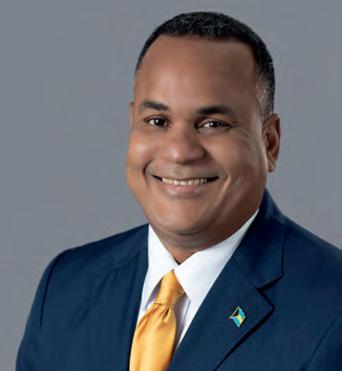
8 minute read
ESTATE PLANNING How to help clients seeking certainty in uncertain times
Certainty in uncertain times
HOW A COMBINATION OF ESTATE‑PLANNING DOCUMENTS CAN HELP AVOID FAMILY CONFLICT AND DISCORD
Advertisement
BY SHARMON Y. INGRAHAM
In the wake of the uncertainty generated by the COVID‑19 pandemic, persons have taken a greater interest in obtaining certainty in other aspects of life. In particular, persons have made it a priority to organise their affairs, taking steps to ensure their wishes are documented and can be effected if necessary. Many persons consider the only necessary document in the organisation of their estate to be a will. While the creation of wills is a prudent step, a will is effective from the date of death until the estate is wound up. To address any period where a person’s wishes cannot be effectively obtained, other documents are necessary. In particular, consideration should be given to the creation of powers of attorney (PoAs), enduring powers of attorney (EPAs) and healthcare or personal welfare declarations as part of proper estate planning.
With its foundation in the law of agency, a PoA gives a person appointed by its terms authority to deal with the financial and business affairs of another. Such PoA could be used to complete a business transaction or other financial matters in circumstances where a person is prevented from attending to the transaction or matter personally. A PoA can be granted generally or limited to a specific transaction or time frame. A PoA, in its original format and usage, is terminated by any period of mental incapacity of the donor, including but not limited to mental disorders, dementia and Alzheimer’s disease.
In The Bahamas, an EPA, created by the Powers of Attorney Act, 1992 (the Act), makes it possible for a PoA to remain in existence and valid after a person has become mentally incapacitated. The use of PoAs and EPAs permits the financial and business affairs of a person to continue uninterrupted during periods of absence, confinement, quarantine or incapability and enables the donee of the power to act on behalf of such person. A healthcare or personal welfare declaration enables a person to convey their wishes and desires regarding medical treatment, the extent of any medical intervention and their personal care.
Faced with periods of confinement, quarantine or inability, whether as a result of health concerns, restricted movement or otherwise, these additional documents can enable the plans and aspirations of the donor to be discerned and fulfilled.
ENDURING POWERS OF ATTORNEY
Section 4 of the Act, which introduced EPAs into the law of The Bahamas, provides that:
‘(1) The authority of a donee given by an instrument creating a power of attorney that— • provides that the authority is to continue notwithstanding
any mental incapacity of the donor; and • is signed by the donor and a witness to the signature of the donor, other than the donee or the spouse of the donee, is not terminated by reason only of the subsequent mental incapacity of the donor that would but for this
Act terminate the authority.’
In addition to the provisions of the Act, the Powers of Attorney Rules, 1996, established pursuant to the Act, mandate conditions for the valid and effective execution of EPAs.
To ensure the validity of an EPA created in accordance with the Act, the instrument must, with certain permissible deletions and adaptions provided for in the Act and its accompanying rules, be in the prescribed form under the legislation. To the extent the instrument creating the EPA purports to exclude any required provision of the Act or its rules, the instrument would be invalid as an EPA under the statute. In that event, if such instrument becomes necessary upon a person becoming mentally incapacitated, the invalid document would be ineffective.
The Act and its rules also require that the instrument be signed by both the person appointing another to deal with their financial and business affairs and the person being appointed. The duly executed and properly witnessed instrument must also be lodged at the Supreme Court Registry.
After the EPA has been fully executed and lodged with the Supreme Court Registry, it may be properly relied upon

and utilised by the person/s appointed to deal with the financial and business affairs of the appointor.
However, where healthcare and personal care decisions need to be made, or will likely need to be made, a PoA or an EPA is inapplicable. Under s.2 of the Act, mental incapacity is defined as meaning in relation to the person ‘that the person is incapable … of managing and administering his property and affairs’. On that basis, considering the definition of mental incapacity, the scope of the authority derived from an EPA thereunder would be limited to property, business and financial matters.
The authors of Butterworths Wills, Probate & Administration Service (issue 119, June 2021) note at paragraph 2.3 that the England and Wales Court of Protection has deleted from EPAs provisions directed at healthcare or personal care matters. Accordingly, where it is desirable to convey wishes or instructions for medical or healthcare decisions or other personal matters, such wishes or instructions ought to be set out in a statement declaring the person’s directions.
HEALTHCARE AND PERSONAL WELFARE DECLARATIONS
Many persons consider it unthinkable and/or inhumane to be placed on machines or other treatment methods to sustain bodily functions where there is no detectable brain function, while other persons prefer that every medical resource available should be pursued to sustain life for as long as possible. To assist family members to determine a person’s position with regard to such treatment, a healthcare and personal welfare statement or declaration could be helpful. In some jurisdictions such documents are termed ‘living wills’ or ‘advanced directives’ and are supported by legislation enacted for that purpose. At present, in The Bahamas there is no legislation that specifically addresses or permits the creation of such instruments. However, a declaration of a person’s wishes may be made in accordance with the Oaths Act to help to avoid family uncertainty and conflict.
In creating a healthcare declaration, one may derive guidance from decisions of the courts in the UK. In considering the issue of such instruments regarding medical treatment, the England and Wales Court of Appeal in Re T (Adult: Refusal of Treatment), 1 per Lord Donaldson of Lymington MR, held:
‘… An adult patient who, like Miss T., suffers from no mental incapacity has an absolute right to choose whether to consent to medical treatment, to refuse it or to choose one rather than another of the treatments being offered … This right of choice is not limited to decisions which others might regard as sensible. It exists notwithstanding that the reasons for making the choice are rational, irrational, unknown or even non‑existent …’
In another English case, Re C (adult: refusal of medical treatment),
2 it was held that the court, exercising its inherent jurisdiction, may via injunction or declaration rule that an individual was capable of refusing or consenting to medical treatment, and that could include future medical treatment. Finally, Mr Justice Munby in HE v A Hospital NHS Trust and Another3 summarised the law at para.46 thereof:
‘… I can summarise the law as follows: • There are no formal requirements for a valid advance directive. An advance directive need not be either in or evidenced in writing. An advance directive may be oral or in writing. • There are no formal requirements for the revocation of an advance directive. … • An advance directive is inherently revocable. Any condition in an advance directive purporting to make it irrevocable … and any provision in an advance directive purporting to impose formal or other conditions upon its revocation, is contrary to public policy and void. … • The existence and continuing validity and applicability of an advance directive is a question of fact. Whether an advance directive has been revoked or has for some other reason ceased to be operative is a question of fact. • The burden of proof is on those who seek to establish the existence and continuing validity and applicability of an advance directive. • Where life is at stake the evidence must be scrutinised with especial
care. Clear and convincing proof is required. … • If there is doubt that doubt falls to be resolved in favour of the preservation of life.’
In light of the above, it is clear that it is permissible to designate, in some form, directions for medical and healthcare as well as personal care. For certainty and ease of reference, it is advisable that the authorisation regarding medical, healthcare and personal care matters be addressed in writing which can be produced and consulted as necessary. There is at present no reported Bahamian case law on the issue, so it remains to be determined what guidance the court would give in the circumstances. However, setting out in an official document a person’s wishes, instructions and directions for medical treatment, and the scope of treatment to be administered when such instructions cannot be verbally communicated, would provide guidance to family members and medical professionals when determining a treatment plan. Where the declaration addresses personal care, the wishes of the person for matters like living arrangements, such as home care versus residential institutions, would assist in avoiding family conflict as to where an elderly relative should live.
CONCLUSION
Good estate planning addressing issues in the event of a prolonged absence, an inability to move freely or difficulty in communicating can be achieved through the creation of a will, an EPA and a healthcare and personal care declaration. The combination of these documents would ensure that a person’s wishes and directions are clearly discerned and effected during any periods of incapacity, whether physical or mental. The existence of such estate‑planning documents can also avoid family conflict and discord. A combination of these essential planning documents can give persons comfort and certainty in the midst of an uncertain and unsettling time.
1 [1993] Fam 95 2 [1994] 1 All ER819 3 [2003] EWHC 1017(Fam)
Sharmon Y. Ingraham is a Partner at Higgs & Johnson











